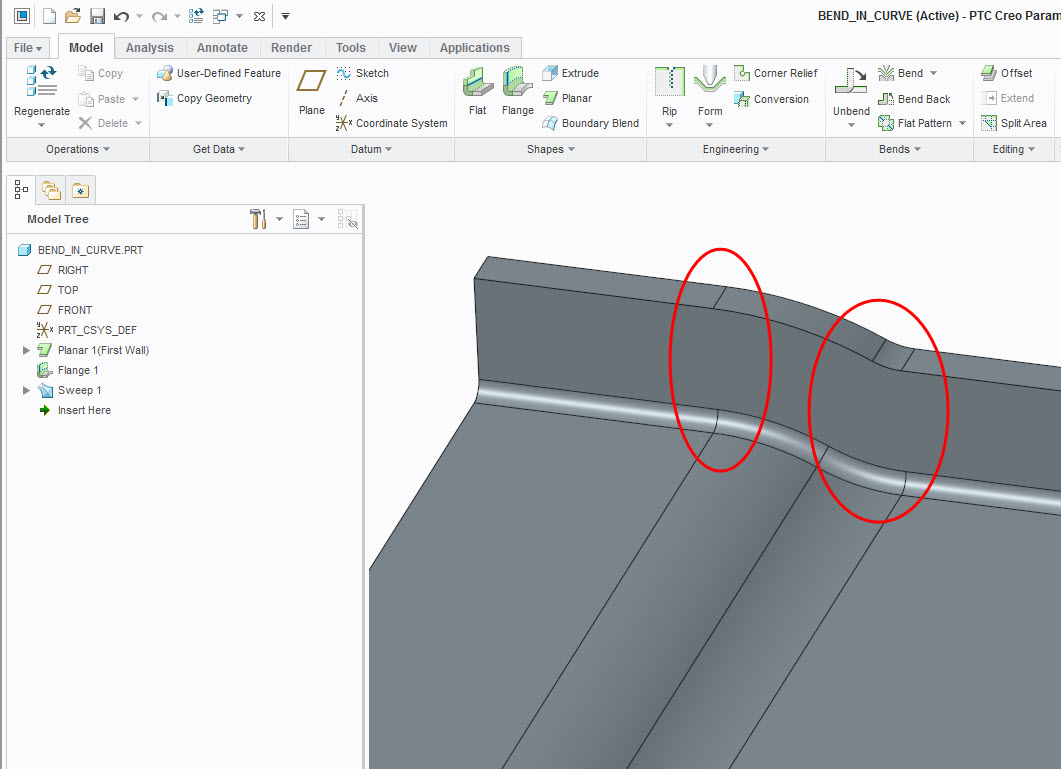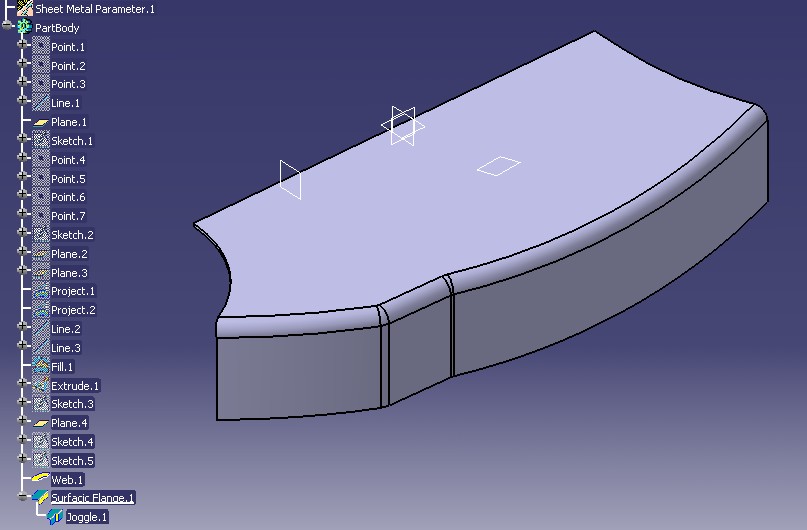Sheet Metal Joggle
Sheet Metal Joggle - Web what is joggle forming. Note that closed hems, teardrop, and edge bead are all. Often, these bends are in opposite directions and less than 90°. Web a joggle, often found at the intersection of stringers and formers, is the offset formed on a part to allow clearance for a sheet or another mating part. Joggle forming presses create multiple bends on sheet metal simultaneously. This allows the sheet metal parts to fit around each other in assembly, with the stationary to offset. This is a cad setup for an open hem on two edges. Web a joggle bend in sheet metal (at top of image) and a hand joggling tool joggling , [5] also known as joggle bending , is an offset bending process in which two opposite bends with equal angles are formed in a single. Use of the joggle maintains the smooth surface of a joint or. Web with the new joggle command, complex joggles can be created on tabs and flanges.
Note that closed hems, teardrop, and edge bead are all. Joggle forming presses create multiple bends on sheet metal simultaneously. Use of the joggle maintains the smooth surface of a joint or. Web a joggle, often found at the intersection of stringers and formers, is the offset formed on a part to allow clearance for a sheet or another mating part. Web with the new joggle command, complex joggles can be created on tabs and flanges. This allows the sheet metal parts to fit around each other in assembly, with the stationary to offset. Web what is joggle forming. This is a cad setup for an open hem on two edges. Often, these bends are in opposite directions and less than 90°. Web a joggle bend in sheet metal (at top of image) and a hand joggling tool joggling , [5] also known as joggle bending , is an offset bending process in which two opposite bends with equal angles are formed in a single.
This is a cad setup for an open hem on two edges. Often, these bends are in opposite directions and less than 90°. Web what is joggle forming. Web with the new joggle command, complex joggles can be created on tabs and flanges. Web a joggle, often found at the intersection of stringers and formers, is the offset formed on a part to allow clearance for a sheet or another mating part. This allows the sheet metal parts to fit around each other in assembly, with the stationary to offset. Web a joggle bend in sheet metal (at top of image) and a hand joggling tool joggling , [5] also known as joggle bending , is an offset bending process in which two opposite bends with equal angles are formed in a single. A joggle press works by clamping sheet. Joggle forming presses create multiple bends on sheet metal simultaneously. Use of the joggle maintains the smooth surface of a joint or.
Techniform Metal Curving Hot Joggle, Joggle, Hand Form, & Check and
Often, these bends are in opposite directions and less than 90°. This allows the sheet metal parts to fit around each other in assembly, with the stationary to offset. This is a cad setup for an open hem on two edges. Note that closed hems, teardrop, and edge bead are all. Web with the new joggle command, complex joggles can.
Solved Creo Sheetmetal Joggle Tangent Lines PTC User Community
Use of the joggle maintains the smooth surface of a joint or. Often, these bends are in opposite directions and less than 90°. This is a cad setup for an open hem on two edges. Web a joggle bend in sheet metal (at top of image) and a hand joggling tool joggling , [5] also known as joggle bending ,.
Folding sheet metal components with formed joggles using a CNC press
Joggle forming presses create multiple bends on sheet metal simultaneously. Web what is joggle forming. Use of the joggle maintains the smooth surface of a joint or. A joggle press works by clamping sheet. Note that closed hems, teardrop, and edge bead are all.
RVZ Adjustable Joggle Tool YouTube
Often, these bends are in opposite directions and less than 90°. Web what is joggle forming. Note that closed hems, teardrop, and edge bead are all. Joggle forming presses create multiple bends on sheet metal simultaneously. This allows the sheet metal parts to fit around each other in assembly, with the stationary to offset.
OllieG's 914 Joggle Bends, Sheet Metal Brakes and other headaches..
Web a joggle, often found at the intersection of stringers and formers, is the offset formed on a part to allow clearance for a sheet or another mating part. Web what is joggle forming. This is a cad setup for an open hem on two edges. Web a joggle bend in sheet metal (at top of image) and a hand.
OllieG's 914 Joggle Bends, Sheet Metal Brakes and other headaches..
Joggle forming presses create multiple bends on sheet metal simultaneously. Web a joggle bend in sheet metal (at top of image) and a hand joggling tool joggling , [5] also known as joggle bending , is an offset bending process in which two opposite bends with equal angles are formed in a single. A joggle press works by clamping sheet..
Creating and modifying a Joggle
Web a joggle, often found at the intersection of stringers and formers, is the offset formed on a part to allow clearance for a sheet or another mating part. A joggle press works by clamping sheet. Use of the joggle maintains the smooth surface of a joint or. Web what is joggle forming. Note that closed hems, teardrop, and edge.
Joggled sheet metal brackets and their uses in UK industry
Joggle forming presses create multiple bends on sheet metal simultaneously. Note that closed hems, teardrop, and edge bead are all. A joggle press works by clamping sheet. Often, these bends are in opposite directions and less than 90°. Web what is joggle forming.
Techniform Metal Curving Hot Joggle, Joggle, Hand Form, & Check and
Joggle forming presses create multiple bends on sheet metal simultaneously. Web a joggle bend in sheet metal (at top of image) and a hand joggling tool joggling , [5] also known as joggle bending , is an offset bending process in which two opposite bends with equal angles are formed in a single. This allows the sheet metal parts to.
Joggled sheet metal brackets and their uses in UK industry
Web what is joggle forming. Joggle forming presses create multiple bends on sheet metal simultaneously. Use of the joggle maintains the smooth surface of a joint or. A joggle press works by clamping sheet. Web with the new joggle command, complex joggles can be created on tabs and flanges.
Use Of The Joggle Maintains The Smooth Surface Of A Joint Or.
Web what is joggle forming. A joggle press works by clamping sheet. This is a cad setup for an open hem on two edges. Web a joggle, often found at the intersection of stringers and formers, is the offset formed on a part to allow clearance for a sheet or another mating part.
Note That Closed Hems, Teardrop, And Edge Bead Are All.
Joggle forming presses create multiple bends on sheet metal simultaneously. Web with the new joggle command, complex joggles can be created on tabs and flanges. Web a joggle bend in sheet metal (at top of image) and a hand joggling tool joggling , [5] also known as joggle bending , is an offset bending process in which two opposite bends with equal angles are formed in a single. This allows the sheet metal parts to fit around each other in assembly, with the stationary to offset.









